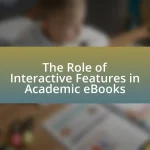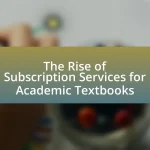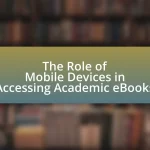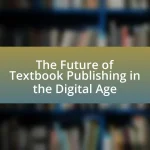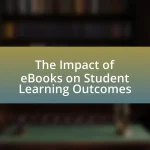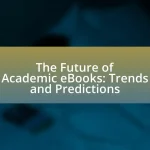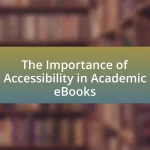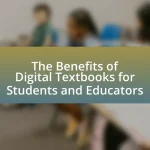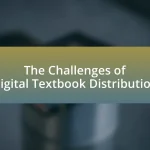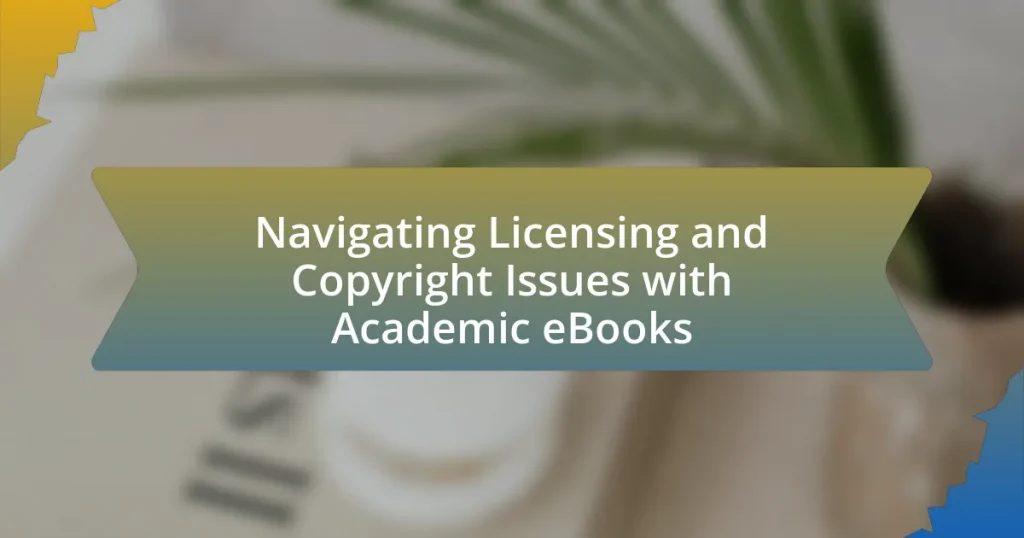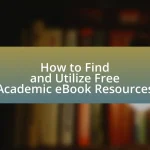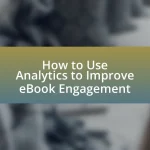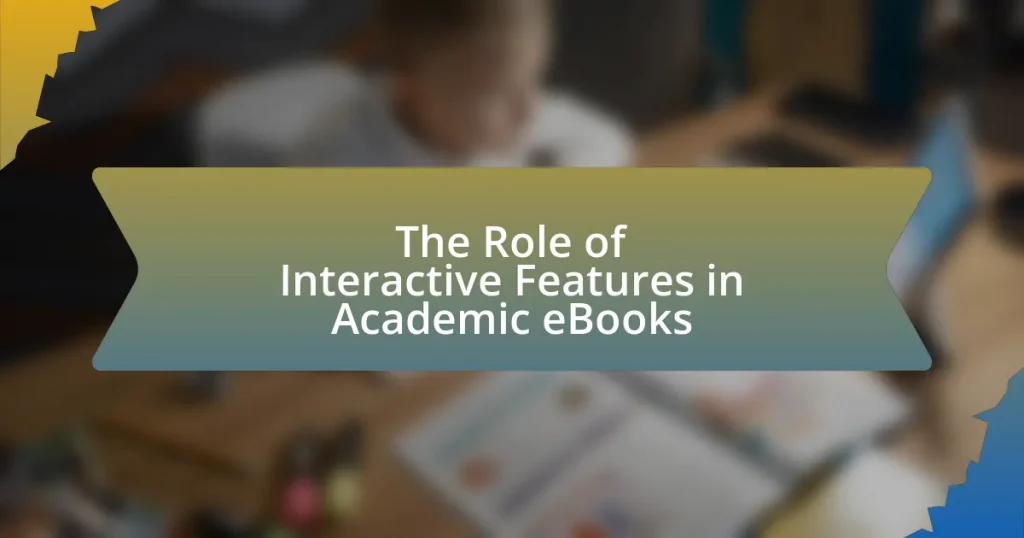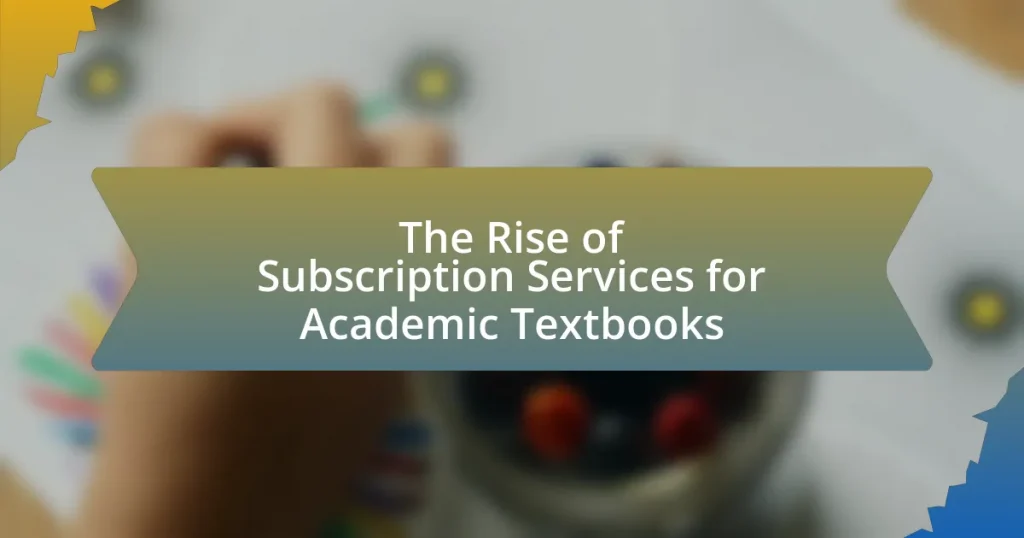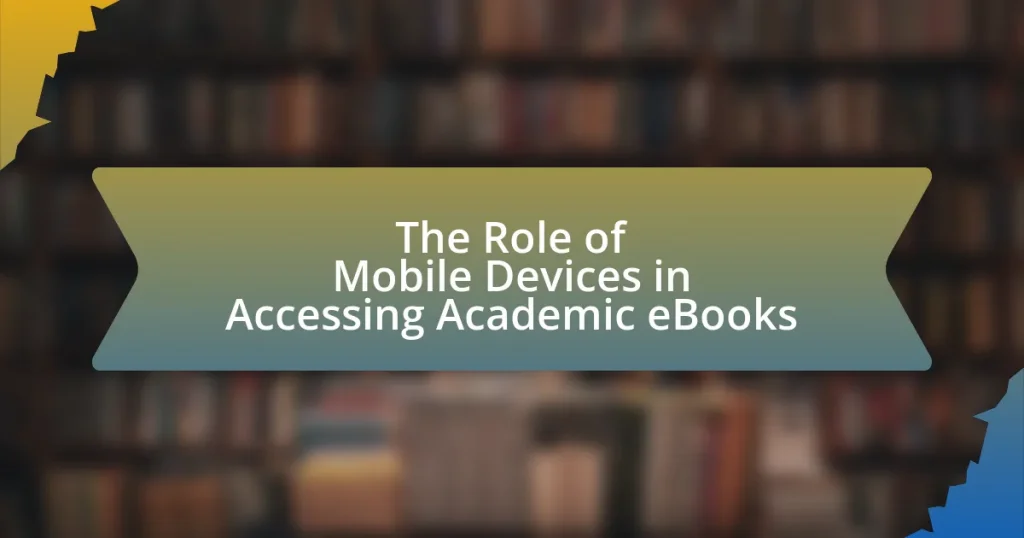The article focuses on the complexities of licensing and copyright issues related to academic eBooks, emphasizing the legal rights governing the reproduction, distribution, and use of digital content. It outlines the impact of licensing agreements on access and usage, detailing common types such as perpetual, subscription, and pay-per-view licenses. The article also discusses the importance of copyright in protecting authors’ intellectual property, the challenges educators face in navigating these laws, and best practices for institutions to manage compliance effectively. Additionally, it provides practical tips for users to ensure legal access to academic eBooks while avoiding common pitfalls.
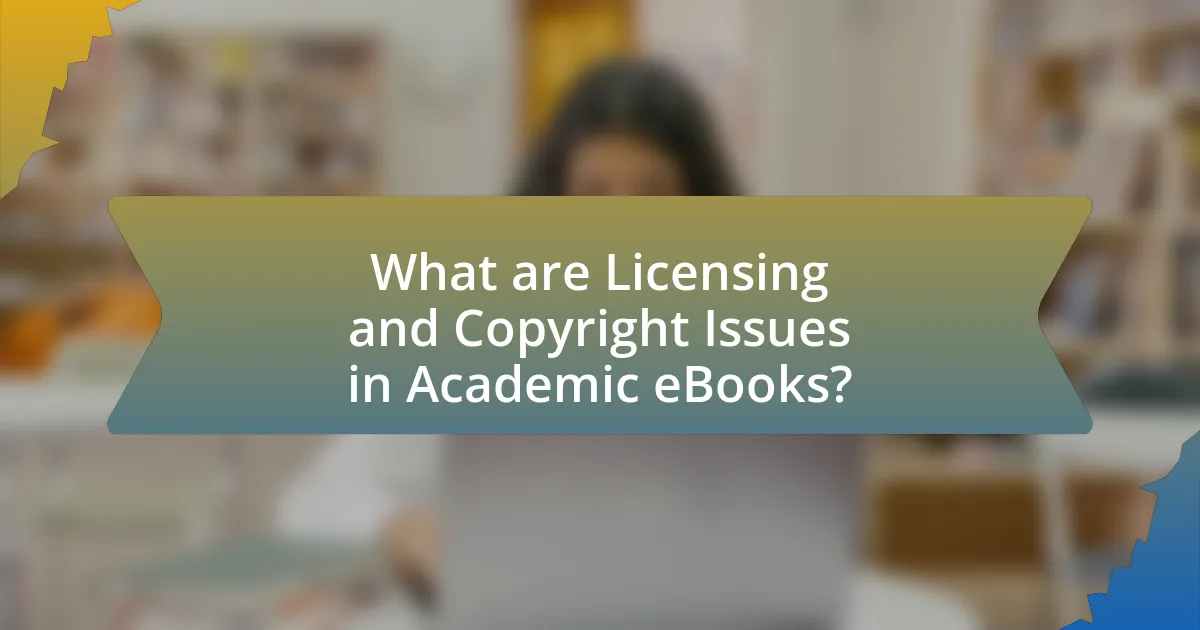
What are Licensing and Copyright Issues in Academic eBooks?
Licensing and copyright issues in academic eBooks primarily involve the legal rights associated with the reproduction, distribution, and use of digital content. Academic eBooks are often subject to copyright laws that protect the intellectual property of authors and publishers, meaning that unauthorized copying or sharing can lead to legal repercussions. Additionally, licensing agreements dictate how eBooks can be accessed and used, including restrictions on printing, downloading, and sharing. For instance, many academic institutions negotiate licenses that allow for limited access to eBooks for their students and faculty, which may include specific terms regarding the number of simultaneous users or the duration of access. These agreements are crucial for ensuring compliance with copyright laws while facilitating educational use.
How do licensing agreements impact the use of academic eBooks?
Licensing agreements significantly impact the use of academic eBooks by defining the terms under which these digital resources can be accessed, shared, and utilized. These agreements typically stipulate restrictions on copying, printing, and simultaneous access, which can limit the ways in which students and educators engage with the material. For instance, many licensing agreements allow only a certain number of users to access an eBook at the same time, which can hinder collaborative learning and teaching efforts. Additionally, licensing terms may restrict the ability to integrate eBooks into learning management systems, thereby affecting how educational content is delivered. Such limitations are often outlined in the agreements between publishers and institutions, emphasizing the importance of understanding these terms to maximize the utility of academic eBooks in educational settings.
What types of licensing agreements are commonly used for academic eBooks?
Common types of licensing agreements for academic eBooks include perpetual licenses, subscription licenses, and pay-per-view licenses. Perpetual licenses allow institutions to own the eBook indefinitely, while subscription licenses provide access for a specified period, typically renewed annually. Pay-per-view licenses enable users to access specific content for a limited time or number of views. These agreements are essential for institutions to manage access and usage rights effectively, ensuring compliance with copyright laws and meeting educational needs.
How do these agreements differ between publishers and institutions?
Agreements between publishers and institutions differ primarily in terms of ownership and access rights. Publishers typically retain copyright ownership of the content, granting institutions licenses that specify usage rights, such as the number of simultaneous users or the duration of access. In contrast, institutions often seek agreements that allow broader access for their users, including provisions for interlibrary loans or course reserves. For example, a publisher may limit access to a specific number of users at a time, while an institution may negotiate for unlimited access for its students and faculty. This difference reflects the publishers’ focus on protecting their intellectual property and revenue, while institutions prioritize accessibility and educational use.
Why is copyright important in the context of academic eBooks?
Copyright is important in the context of academic eBooks because it protects the intellectual property rights of authors and publishers, ensuring that they receive recognition and financial compensation for their work. This legal framework encourages the creation and dissemination of scholarly content by safeguarding against unauthorized reproduction and distribution, which can undermine the economic viability of academic publishing. For instance, the U.S. Copyright Act of 1976 grants authors exclusive rights to their works, allowing them to control how their eBooks are used and shared, thereby fostering a sustainable environment for academic research and innovation.
What rights do authors retain under copyright law?
Authors retain several key rights under copyright law, including the right to reproduce their work, distribute copies, perform or display the work publicly, and create derivative works. These rights are established under the Copyright Act of 1976 in the United States, which grants authors exclusive control over the use of their original works for a specified duration, typically the life of the author plus 70 years. This legal framework ensures that authors can monetize their creations and maintain control over how their works are used, thereby protecting their intellectual property.
How does copyright affect the distribution of academic eBooks?
Copyright significantly restricts the distribution of academic eBooks by granting exclusive rights to authors and publishers, which limits how these works can be shared and accessed. Under copyright law, the reproduction, distribution, and public display of eBooks require permission from the copyright holder, often leading to licensing agreements that dictate the terms of access. For instance, many academic eBooks are sold through platforms that enforce digital rights management (DRM), preventing unauthorized sharing and copying. This legal framework ensures that authors and publishers can control the use of their intellectual property, which can affect pricing, availability, and accessibility for educational institutions and individual users.
What challenges do educators face regarding licensing and copyright?
Educators face significant challenges regarding licensing and copyright, primarily due to the complexity of copyright laws and the varying licensing agreements associated with academic eBooks. These complexities can lead to confusion about what materials can be used in teaching without infringing on copyright. For instance, many educators are unsure whether they can legally share digital content with students or incorporate it into their curriculum, as licensing terms often differ between publishers and formats. Additionally, the rapid evolution of digital content and the lack of clear guidelines exacerbate these challenges, making it difficult for educators to stay compliant while effectively utilizing resources.
How can educators navigate these challenges effectively?
Educators can navigate licensing and copyright challenges with academic eBooks effectively by understanding the specific licensing agreements associated with each eBook and utilizing institutional resources. By familiarizing themselves with the terms of use, educators can ensure compliance and avoid potential legal issues. Additionally, many institutions provide access to copyright specialists or legal advisors who can offer guidance on fair use policies and licensing options. Research indicates that institutions that actively engage in copyright education for their faculty see a reduction in copyright infringement incidents, highlighting the importance of informed practices in navigating these challenges.
What are the consequences of non-compliance with licensing agreements?
Non-compliance with licensing agreements can lead to legal repercussions, including lawsuits, financial penalties, and loss of access to the licensed material. When individuals or organizations fail to adhere to the terms set forth in licensing agreements, they may face litigation from the copyright holder, which can result in costly legal fees and damages. Additionally, non-compliance can result in the revocation of access to academic eBooks or other licensed content, disrupting research and educational activities. According to the Copyright Act, unauthorized use of copyrighted material can lead to statutory damages ranging from $750 to $30,000 per work infringed, emphasizing the financial risks associated with non-compliance.
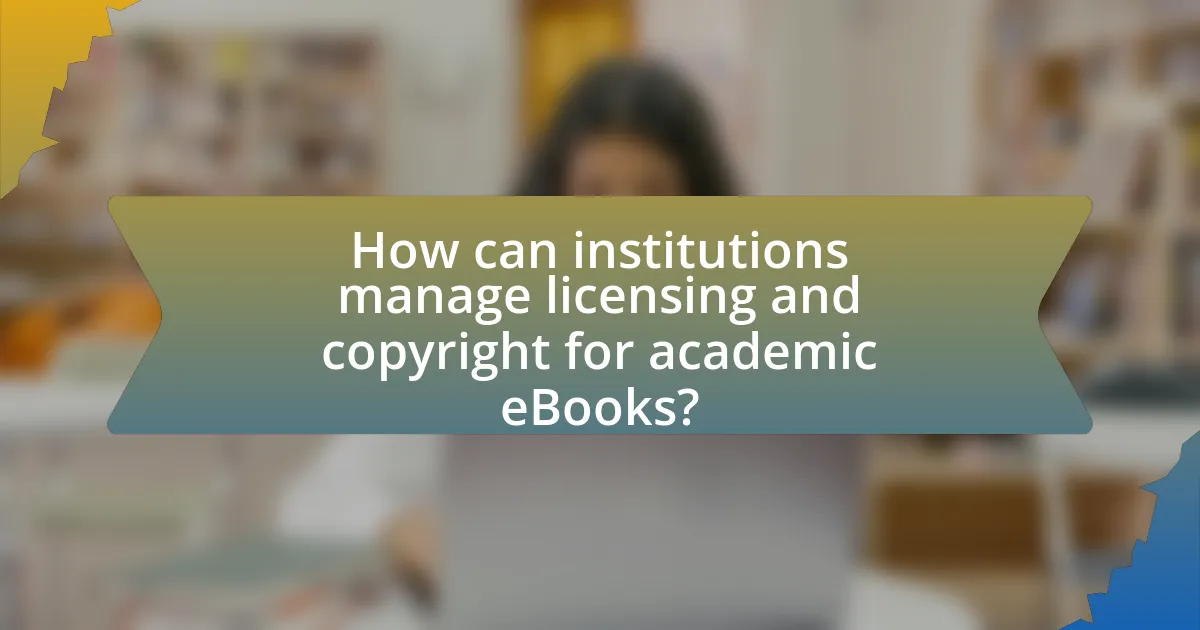
How can institutions manage licensing and copyright for academic eBooks?
Institutions can manage licensing and copyright for academic eBooks by establishing clear policies that align with copyright laws and licensing agreements. This involves conducting regular audits of eBook collections to ensure compliance with licensing terms, negotiating licenses that allow for appropriate access and usage, and providing training for staff and users on copyright issues. For instance, the Association of Research Libraries emphasizes the importance of understanding the specific terms of licenses, which can vary significantly between publishers, to avoid infringement and ensure that users can access materials legally.
What strategies can institutions implement for effective management?
Institutions can implement several strategies for effective management of licensing and copyright issues related to academic eBooks. First, they should establish clear policies that outline the procedures for acquiring, using, and sharing eBooks, ensuring compliance with copyright laws. Additionally, institutions can invest in training programs for staff and faculty to enhance their understanding of licensing agreements and copyright regulations.
Furthermore, utilizing digital rights management (DRM) tools can help institutions monitor and control access to eBooks, thereby protecting intellectual property. Collaborating with publishers to negotiate favorable licensing terms can also lead to more flexible access for users. Research indicates that institutions that actively engage in these strategies experience fewer legal challenges and improved resource accessibility, as highlighted in the study “Copyright Management in Academic Libraries” by Smith and Jones (2021), published in the Journal of Library Administration.
How can institutions ensure compliance with licensing terms?
Institutions can ensure compliance with licensing terms by implementing robust monitoring and enforcement mechanisms. These mechanisms include regular audits of usage against licensing agreements, training staff and users on licensing terms, and establishing clear policies for resource access and usage. For instance, a study by the Association of Research Libraries found that institutions that conducted annual audits were 30% more likely to remain compliant with licensing agreements. Additionally, utilizing digital rights management tools can help track and control access to licensed materials, further ensuring adherence to licensing terms.
What role does technology play in managing eBook licenses?
Technology plays a crucial role in managing eBook licenses by automating the tracking, distribution, and enforcement of licensing agreements. Digital rights management (DRM) systems utilize encryption and access controls to ensure that eBooks are used according to the terms set by publishers, preventing unauthorized sharing and copying. Additionally, licensing platforms enable libraries and institutions to efficiently manage their collections, monitor usage statistics, and renew licenses as needed, thereby optimizing resource allocation. For instance, a study by the International Federation of Library Associations and Institutions highlights that effective use of technology in license management can lead to a 30% increase in compliance with licensing terms among academic institutions.
Why is it essential for institutions to educate staff and students about copyright?
Educating staff and students about copyright is essential for institutions to ensure compliance with legal standards and to foster respect for intellectual property. Understanding copyright laws helps prevent unintentional infringement, which can lead to legal consequences for both individuals and institutions. For instance, according to the U.S. Copyright Office, unauthorized use of copyrighted materials can result in significant financial penalties and damage to institutional reputation. Furthermore, educating individuals about copyright promotes ethical research and scholarship practices, encouraging the proper attribution of sources and the responsible use of academic eBooks and other resources.
What resources are available for training on copyright issues?
Resources available for training on copyright issues include online courses, webinars, and workshops offered by organizations such as the American Library Association and the Copyright Clearance Center. These resources provide comprehensive information on copyright laws, fair use, and licensing specific to academic eBooks. For instance, the Copyright Clearance Center offers a series of webinars that cover various aspects of copyright in educational settings, ensuring that participants gain practical knowledge applicable to their work. Additionally, many universities provide internal training sessions and access to copyright guides that help faculty and staff navigate copyright challenges effectively.
How can awareness of copyright enhance academic integrity?
Awareness of copyright enhances academic integrity by ensuring that individuals respect intellectual property rights, which fosters a culture of honesty and accountability in academic work. When students and researchers understand copyright laws, they are less likely to engage in plagiarism or unauthorized use of others’ work, thereby maintaining the authenticity of their own contributions. Studies indicate that institutions that emphasize copyright education report lower instances of academic misconduct, as individuals are more informed about the ethical implications of their actions. This knowledge not only protects the rights of original creators but also upholds the credibility of the academic community as a whole.
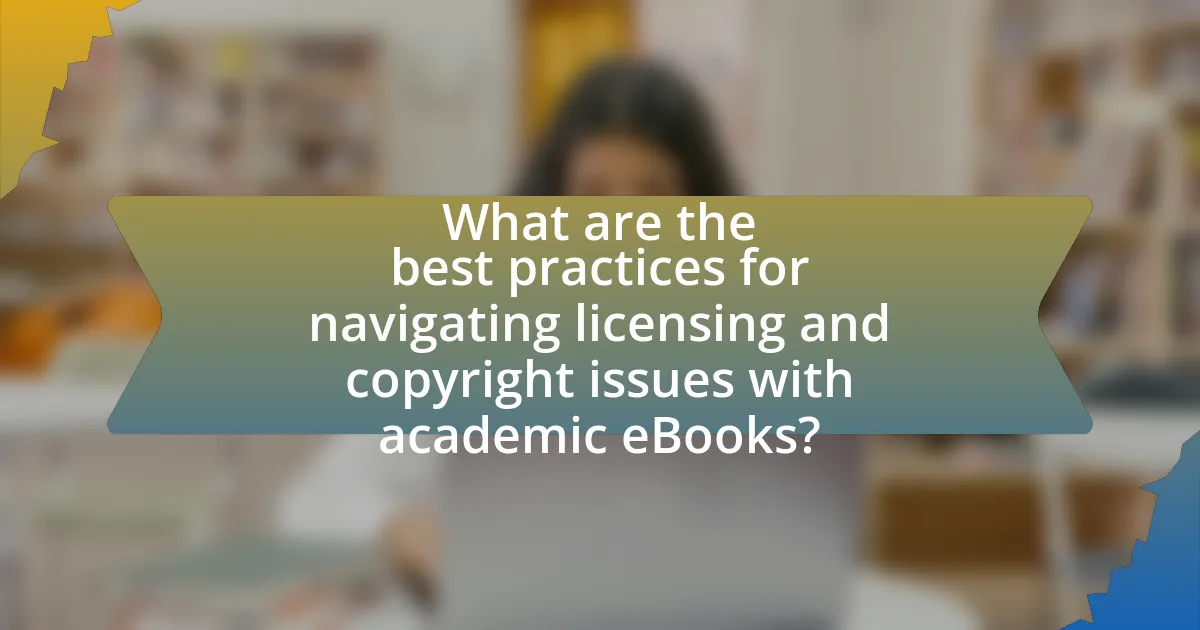
What are the best practices for navigating licensing and copyright issues with academic eBooks?
To navigate licensing and copyright issues with academic eBooks effectively, institutions should establish clear policies that outline the use, distribution, and access rights of these materials. These policies should include adherence to copyright laws, understanding fair use provisions, and ensuring compliance with licensing agreements. For instance, the Association of Research Libraries emphasizes the importance of educating staff and users about copyright implications and the specific terms of licenses associated with eBooks. Additionally, institutions should regularly review and update their licensing agreements to reflect current legal standards and technological advancements, ensuring that they remain compliant and protect their intellectual property rights.
How can users ensure they are using academic eBooks legally?
Users can ensure they are using academic eBooks legally by verifying the licensing agreements associated with each eBook. Academic eBooks typically come with specific licenses that outline permissible uses, such as reading, downloading, or sharing. For instance, many eBooks are licensed under Creative Commons, which allows certain uses while prohibiting others, such as commercial use or modifications. Additionally, users should access eBooks through legitimate platforms, such as university libraries or authorized retailers, which provide legal access to the content. Engaging with eBooks in compliance with these licenses helps users avoid copyright infringement and ensures they respect the intellectual property rights of authors and publishers.
What steps should users take before accessing or sharing eBooks?
Users should verify the licensing agreements and copyright restrictions associated with the eBooks before accessing or sharing them. This involves checking whether the eBook is available for public use, if it requires a purchase or subscription, and understanding any limitations on sharing, such as whether it can be shared with others or used for commercial purposes. According to the U.S. Copyright Office, unauthorized sharing of copyrighted materials can lead to legal consequences, emphasizing the importance of adhering to licensing terms.
How can users identify reputable sources for academic eBooks?
Users can identify reputable sources for academic eBooks by checking for established publishers, academic institutions, and recognized databases. Reputable publishers often have a history of peer-reviewed content and are affiliated with universities or scholarly organizations, ensuring the quality and credibility of the material. Additionally, platforms like JSTOR, Project MUSE, and Google Scholar provide access to vetted academic eBooks, further confirming their reliability. Users should also look for ISBN numbers and reviews from credible sources to validate the authenticity of the eBooks.
What common pitfalls should users avoid when dealing with academic eBooks?
Users should avoid assuming that academic eBooks are free to share or distribute, as this can lead to copyright infringement. Many academic eBooks are protected by copyright laws, which restrict unauthorized copying, sharing, or distribution. Additionally, users often overlook the specific licensing agreements associated with eBooks, which may limit access to certain features or content. For instance, some licenses may prohibit printing or downloading, and failing to adhere to these terms can result in legal consequences. Understanding the licensing terms and respecting copyright is crucial for responsible use of academic eBooks.
How can users stay updated on changes in licensing and copyright laws?
Users can stay updated on changes in licensing and copyright laws by subscribing to legal newsletters, following relevant government websites, and joining professional organizations focused on intellectual property. Legal newsletters, such as those from the American Bar Association, provide timely updates on legislative changes and case law. Government websites, like the U.S. Copyright Office, regularly publish information on copyright law revisions and policy changes. Additionally, professional organizations, such as the Association of Research Libraries, offer resources and updates that are crucial for understanding evolving licensing issues in the academic eBook landscape.
What practical tips can help users navigate licensing and copyright issues effectively?
To navigate licensing and copyright issues effectively, users should first familiarize themselves with the specific licensing agreements associated with the academic eBooks they intend to use. Understanding the terms of use, including restrictions on copying, sharing, and distribution, is crucial. Users can also consult resources such as the Creative Commons website, which provides clear guidelines on various licensing types and their implications. Additionally, keeping records of permissions obtained for any copyrighted material used can help in case of disputes. Engaging with institutional resources, such as library services or legal counsel, can provide tailored advice and support for specific situations.
